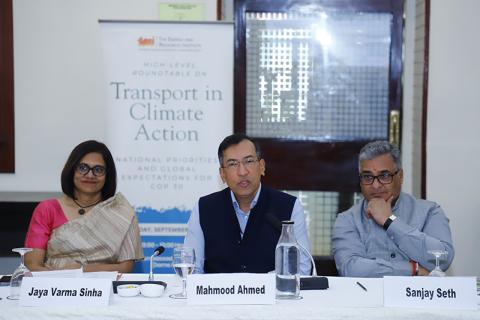The Energy and Resources Institute (TERI) recently hosted the roundtable “Transport in Climate Action: National Priorities and Global Expectations for COP30” on September 26, 2025. The event was pivotal for stakeholders to engage in discussions surrounding the decarbonization of the transport sector, particularly in India and other developing nations. With an evolving global scenario emphasizing finance, technology, and equity, this gathering served as a platform for the exchange of ideas to achieve low-carbon mobility.
The Importance of Transport in Climate Action
Transport is a significant contributor to global greenhouse gas emissions, responsible for nearly a quarter of CO₂ emissions and marked as one of the fastest-growing sources of energy-related emissions. The urgency for collective action is undeniable, especially as global climate conferences, such as COP30, approach. Mr. Sanjay Seth, Senior Director at TERI, highlighted the immediate need for coherent strategies that align the transport sector with frugal climate objectives.
Indian officials, notably Shri Mahmood Ahmed, Additional Secretary at the Ministry of Road Transport and Highways (MoRTH), affirmed the commitment toward sustainable development and India’s mission to achieve net-zero emissions by 2070. Reiterating the importance of inclusive policies, he underscored advancements in emission norms and sustainable energy sources like methanol and CNG.
Key Themes of the Roundtable
The roundtable discussions were organized around two main themes: policy and technology readiness and financing and equity. A prominent part of the dialogue was the principle of Common but Differentiated Responsibilities and Respective Capabilities (CBDR-RC), which seeks to balance equity and ambition in climate action. Despite a growing body of research, the latest UNFCCC reports indicate that, without robust commitments, global emissions could reach critical levels, depleting the carbon budget necessary to limit warming.
The contributions from international representatives added a broader context to the proceedings. Each country shared its own experiences and strategies for integrating transport into its Nationally Determined Contributions (NDCs), underscoring the shared international obligation to address climate change effectively.
Financing as a Central Challenge
A major discussion point was the financing of transport initiatives. The COP29 goal of mobilizing USD 300 billion per annum by 2035 is critical, but developing nations like India see the need for even more substantial financial commitments—up to USD 1.3 trillion annually by 2030—to support a just and equitable transition.
Mobility solutions in developing economies are indispensable for achieving significant emission reductions in the energy sector. With electric vehicles, enhanced fuel efficiencies, and alternative fuels like biofuels and green hydrogen gaining traction, the push for financing will dictate the pace of progress. Mobilization through multilateral development banks, public-private partnerships, and mechanisms like carbon markets are essential strategies for enabling transformative change.
Technological Advancements and Policy Integration
Technological advancements represent another linchpin in the transition to low-carbon mobility. Participants discussed the importance of building institutional capacity, credible data systems, and aligning national transport strategies with climate objectives. Innovations like electric mobility and dedicated freight corridors, alongside retrofitting existing vehicles, were seen as promising areas for investment and progress.
Furthermore, the journey towards greener transport involves overcoming challenges in data monitoring, demand management, and freight decarbonization. While TERI’s modelling indicates that significant policy actions could reduce transport emissions by as much as 30% by 2050, considerable institutional and infrastructural shortcomings must be addressed to realize this potential.
Lessons and Future Directions
The insights gathered from the roundtable will be pivotal in shaping India’s future NDC updates and negotiations leading up to COP30. Mr. Sharif Qamar, Associate Director at TERI, emphasized the intention to compile key recommendations for various stakeholders to facilitate effective action.
The discussions reiterated that addressing climate change within the transport sector is not isolated but interconnected with broader global climate diplomacy efforts. Equity, ambition, finance, and technologically focused solutions must converge to achieve not only low-carbon mobility for India and other developing nations but also to contribute effectively to the global climate agenda.
Conclusion
The “Transport in Climate Action” roundtable organized by TERI was a necessary step toward aligning national and global climate strategies. As the world moves closer to critical climate deadlines, accelerating efforts in finance, technological innovation, and policy integration will be crucial. Achieving low-carbon mobility requires a collective commitment from all stakeholders—policymakers, industry leaders, and international actors—to foster an equitable and sustainable future. The discussions at this roundtable have laid the groundwork for a collaborative approach to address the urgent challenges posed by the climate crisis, emphasizing that immediate actions today will set the stage for a sustainable tomorrow.










